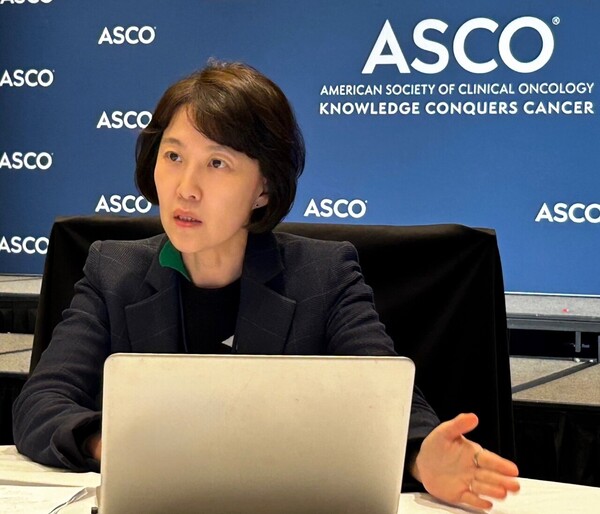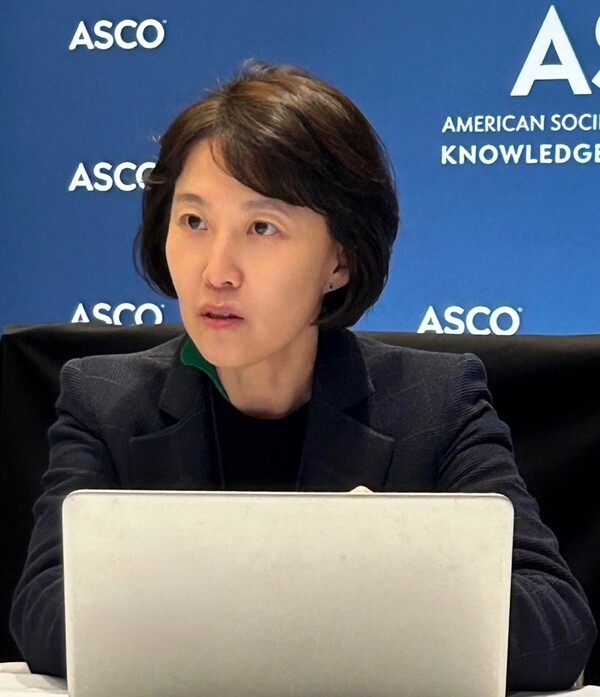Immunotherapy has become a standard treatment for stage-4 non-small cell lung cancer (NSCLC) in Korea, covered by insurance. However, the use of immunotherapy in operable early-stage patients remains non-reimbursable.
In Korea, Opdivo (nivolumab) and Tecentriq (atezolizumab) have already been approved by the Ministry of Food and Drug Safety for adjuvant therapy before and after surgery, respectively. Keytruda (pembrolizumab) is also scheduled to expand its indication to postoperative adjuvant therapy in early-stage lung cancer patients within the year.
In addition, the KEYNOTE-671 study, which used Keytruda as a combination therapy before and after surgery, was recently selected for oral presentation at the American Society of Clinical Oncology’s annual meeting (ASCO 2023), expanding the role of immunotherapy and complicating treatment strategies.

Korea Biomedical Review met with Professor Kim Hye-ryun of the Oncology Department at Severance Hospital, also a director for insurance at the Korean Association for Lung Cancer (KALC), to discuss the role of immunotherapy in treating early-stage NSCLC and explore ways to improve treatment environment for Korean patients.
Keytruda combo therapy before and after surgery reduces recurrence or death risk by 42%
At ASCO 2023, held June 2 to 6 in Chicago, Ill., researchers presented the results of the KEYNOTE-671 study, a phase 3 clinical trial of Keytruda as an adjuvant therapy before and after surgery in patients with early-stage NSCLC.
In the study, the addition of Keytruda before and after surgery in patients with stage 2-3B NSCLC lowered the risk of disease progression, recurrence, or death by 42 percent compared to patients who received conventional neoadjuvant chemotherapy alone.
"More than half of early-stage NSCLC patients experience recurrence after surgery,” said Dr. Heather A. Wakelee, chair of the International Association for the Study of Lung Cancer) and a thoracic oncologist at Stanford University School of Medicine. “These event-free survival (EFS) data are very encouraging and support the potential of pembrolizumab as a perioperative adjuvant therapy for patients with stage 2-3B resectable NSCLC."
Keytruda has demonstrated its role as postoperative adjuvant therapy in patients with early-stage NSCLC. In phase 3 KEYNOTE-091 study, Keytruda fulfilled the primary endpoint by significantly reducing the risk of disease-free survival (DFS) in patients with stage 1B to 3A who underwent complete resection and received adjuvant chemotherapy.
Interim data published last September in the international journal The Lancet Oncology showed that over a median follow-up of 35.6 months, the median DFS in the Keytruda group was 53.6 months, a 24 percent lower risk of recurrence and death than the 42 months in the placebo group. Based on these data, the U.S. Food and Drug Administration approved Keytruda as postoperative adjuvant therapy this past January.
MSD Korea, the domestic distributor of Keytruda, plans to expand the indication this year. As a result, Keytruda, currently used as a standard treatment for the first-line treatment of stage-4 NSCLC, will likely expand its role to early-stage patients in Korea too.
Opdivo and Tecentriq preempted domestic early-stage lung cancer. How do they fare?
However, Keytruda is not the first immunotherapy approved to treat early-stage lung cancer in Korea.
Last October, Opdivo expanded its indication to "preoperative adjuvant therapy in combination with platinum-based chemotherapy in patients with resectable (with tumor size or 4 centimeters or more or positive lymph nodes) NSCLC." A month later, Tecentriq also expanded its indication to "postoperative adjuvant therapy following resection and platinum-based chemotherapy in stage 2-3A patients with PD-L1 expression of 50 percent or higher TC (tumor cell).
In the CheckMate-816 study, an approved clinical trial for Opdivo, treatment with Opdivo combined with neoadjuvant chemotherapy showed statistically significant improvement in pathological complete response (pCR) and event-free survival (EFS) compared to neoadjuvant chemotherapy alone, regardless of the patient's PD-L1 expression.
The pCR rate in the Opdivo group was 24 percent, showing a noticeable difference from 2.2 percent in the control group, and its median event-free survival (mEFS) was 31.6 months, compared with 20.8 months in the control group, reducing the risk of disease progression, relapse or death by 37 percent.
Tecentriq also demonstrated the effect of up to 57 percent in reducing the risk of recurrence or death with additional treatment after complete resection and platinum-based chemotherapy in patients with PD-L1 expression greater than 50 percent in the IMpower010 study, an approved clinical trial.
However, no immunotherapies are covered by insurance to treat early-stage lung cancer in Korea. Tecentriq's distributor, Roche Korea, recently applied for reimbursement for the postoperative adjuvant therapy indication but failed to set reimbursement criteria at the Cancer Disease Review Committee in early May.
BMS Korea and Ono Pharma Korea, which are selling Opdivo, even have yet to submit applications for its reimbursement.
Lung cancer should be completely treated early to reduce recurrence risk

"In lung cancer, which has a high recurrence rate, it's critical to increase cure rate in early stage and reduce recurrence risks," Professor Kim said on the sideline of ASCO 2023.
Kim explained that lung cancer is a highly recurrent cancer, even when detected and treated early. She noted that the recurrence rate varies by stage, adding that about 40 percent of stage 1 patients experience recurrence, and the rate goes up to 45 percent in stage 1B, 62 percent in stage 2, and 76 percent in stage 3.
She then described the clinical value of Opdivo and Tecentriq in patients with early-stage lung cancer.
Kim said, "The indications for Opdivo and Tecentriq do not completely overlap," She explained that in lung cancer, Opdivo is an option to consider during the multidisciplinary phase of the treatment strategy for surgery and radiation therapy after diagnosis, while Tecentriq is an option to consider as consolidation therapy after adjuvant chemotherapy in the absence of visible lesions and before surgery.
"In early-stage patients, the prognosis completely depends on achieving a pCR," Kim said. "Therefore, preoperative treatment with Opdivo could serve as a marker for the prognosis of patients based on their preoperative pCR."
Professor Kim predicted that Tecentriq has a good chance of staging good competition with Keytruda in the future due to its price competitiveness and market-preempting advantage.
However, Kim also noted that the current non-reimbursement situation has made treating patients with early-stage lung cancer more difficult.
"Both Opdivo and Tecentriq are not on the reimbursement list now, so it's even more important for doctors to recommend them," Kim said. "We're prioritizing patients who can benefit the most from the drug, but even if they're not on the reimbursement system, we must still explain these options to patients, prolonging consultation time beyond limitation.”
She also pointed out that the current reimbursement system, which is applied on a regimen-by-regimen basis, is unreasonable. For example, if a patient uses Opdivo preoperative adjuvant therapy on a non-reimbursement basis, even the previously covered platinum-based upfront chemotherapy becomes a 100 percent burden on patients.
This is because Opdivo has won approval for its indication for preoperative adjuvant therapy "in combination with chemotherapy.” In this case, patients must pay out-of-pocket for chemotherapy to administer Opdivo.
"If we continue with the current cancer reimbursement system, where the government pays 95 percent of the cost of cancer treatment, patient's access to treatment will become increasingly difficult," Professor Kim said. “Along with expanding patient co-payments, there is a need to improve reimbursement for anticancer drugs, which are rapidly expanding their role.
Related articles
- Korean cancer researchers present 139 studies at ASCO 2023
- ‘Palliative care neglected amid a flood of expensive cancer drugs’
- [ASCO 2023] Tagrisso shows ‘breakthrough’ benefit in early lung cancer
- [Photo News] ASCO returns to full strength, with Korean firms actively engaged
- ‘Immunotherapies to serve as cornerstone in stage 4 gastric cancer treatment’

